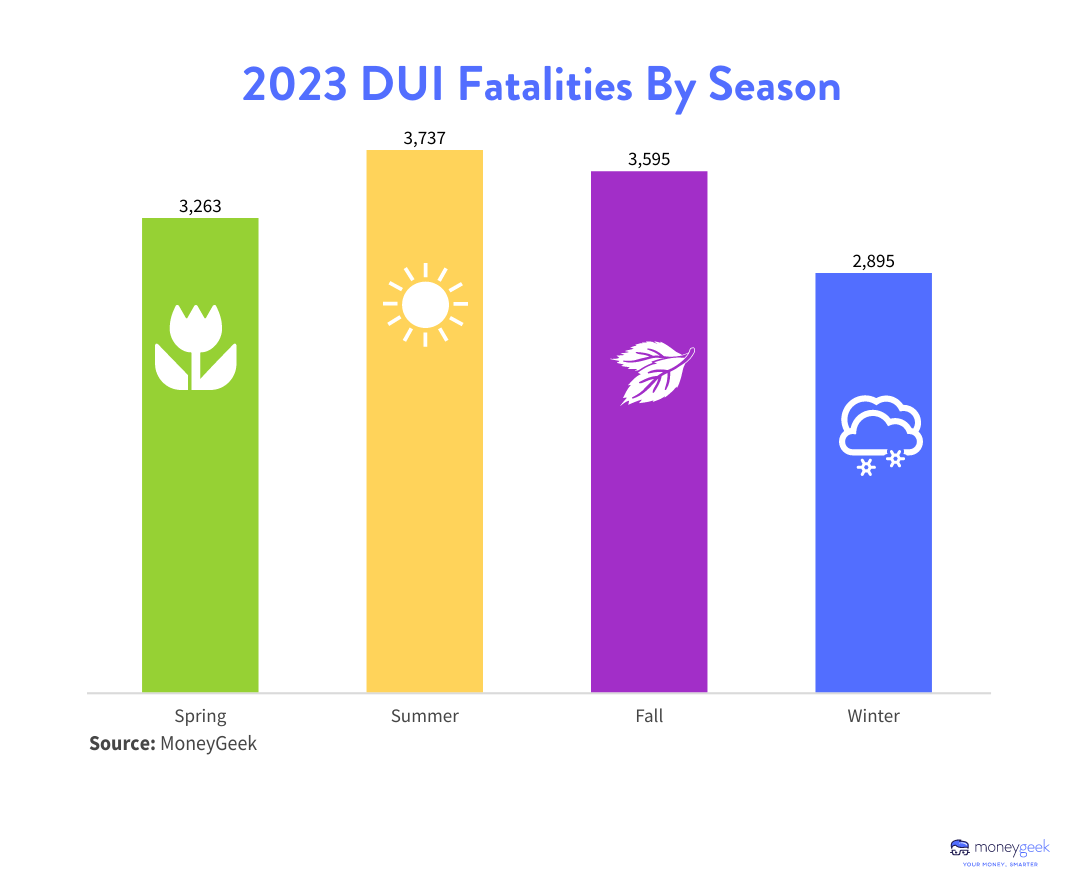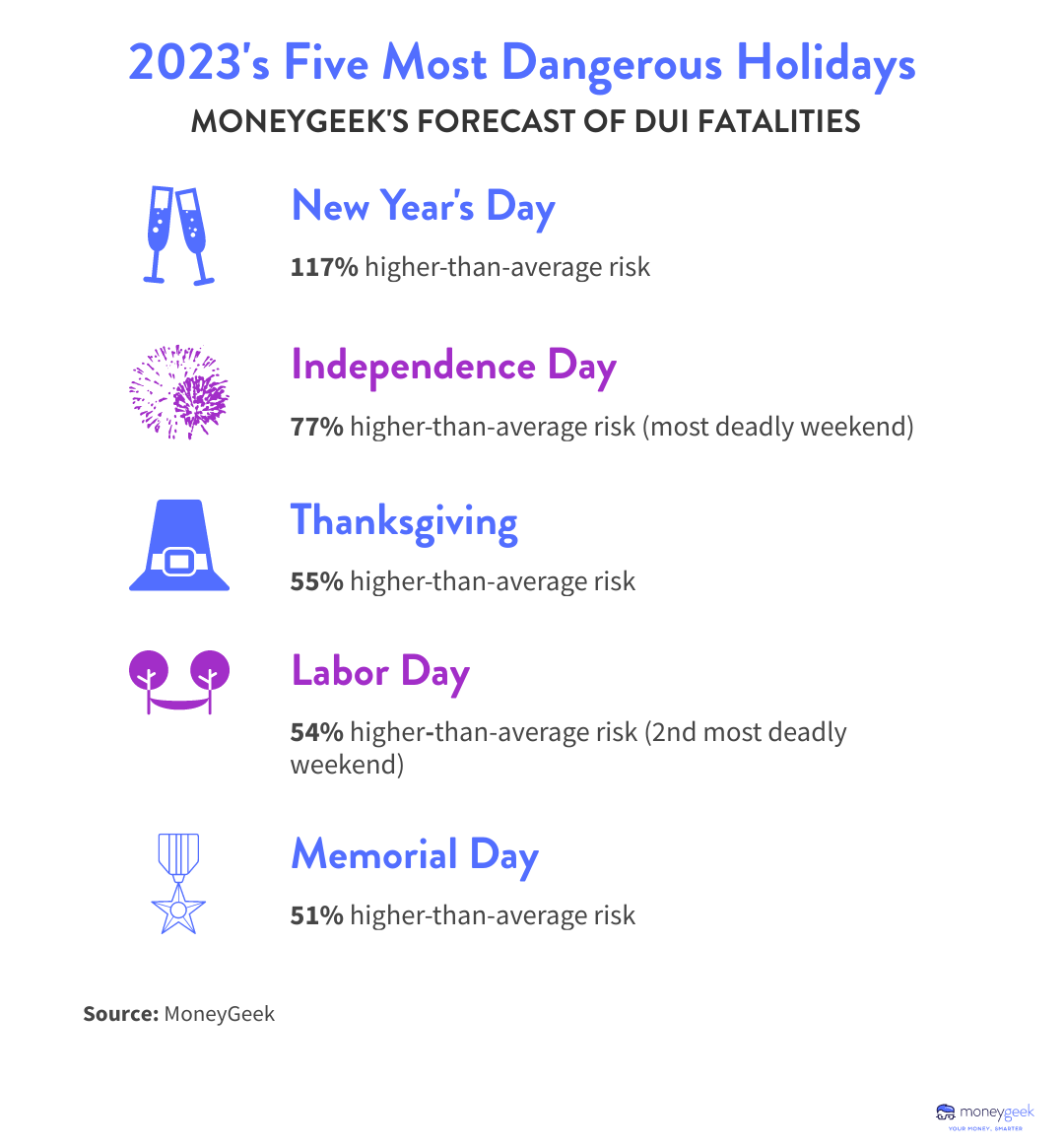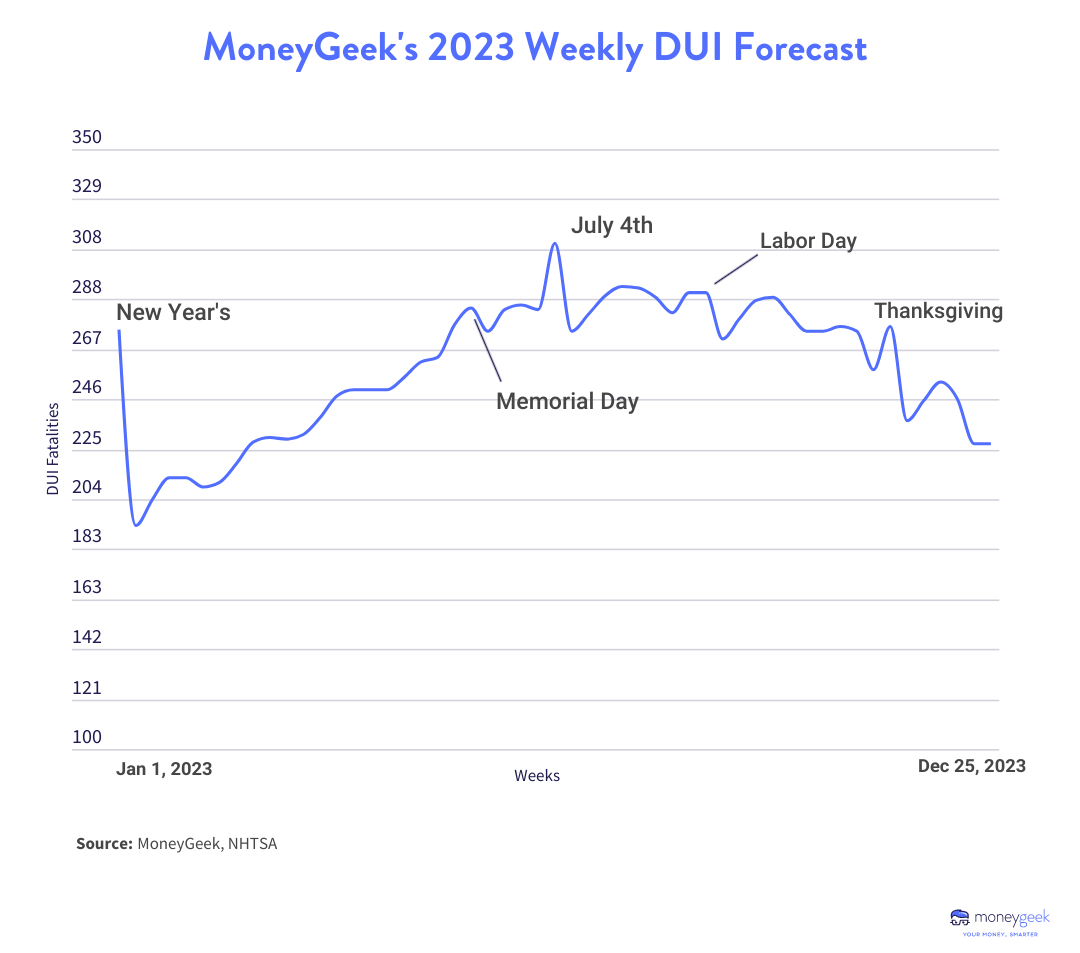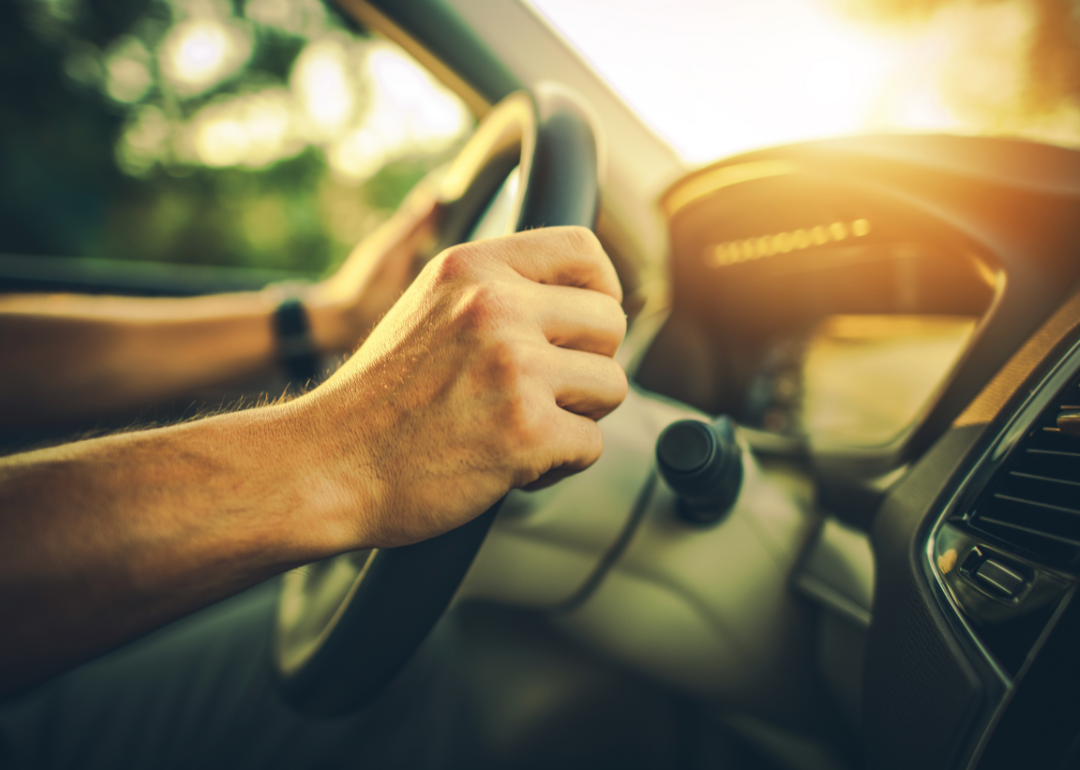
Here are the safest—and most deadly—days for drunk-driving fatalities
Here are the safest—and most deadly—days for drunk-driving fatalities
Drunk driving remains a significant problem throughout the country. But certain days are more dangerous on the roads than others. MoneyGeek analyzed historical data from the U.S. Department of Transportation and the National Highway Traffic Safety Administration (NHTSA) to forecast 2023's most dangerous days, weeks and holidays for driving under the influence (DUI) in the United States.
KEY FINDINGS:
- MoneyGeek forecasts 13,490 DUI fatalities in 2023.
- The historical trend of DUI fatalities that drives the forecast has increased dramatically. 2021's DUI fatalities are 23% higher than 2016's DUI fatalities and are at levels not seen since 2003.
- Summer will account for 28% of drunk driving-related fatalities, making it the deadliest season.
- Independence Day week is forecasted to be the most deadly in 2023, with 311 expected fatalities.
- On New Year's Day, drunk driving-related deaths spike 117% above the baseline average, making it the most dangerous holiday of the year for drunk driving.
- 60% of drunk driving-related fatalities happen on the weekends (Friday through Sunday).

DUI fatalities by season
Drunk driving incidents never really take a hiatus, but certain seasons bring out more than the usual amount of intoxicated drivers. If you want to steer clear of people driving under the influence, the summer is the worst time to drive. According to MoneyGeek's analysis, 28% of DUI-related deaths are projected to happen in the summer of 2023.
Fall is close behind summer when it comes to the number of DUI fatalities per season, though, coming in with 27%. Spring has 24% of DUI incidents. Winter presents its own seasonal dangers on the road, but you'll still need to avoid drunk drivers during this chilly time of year. At 21%, winter is the least likely season to be involved in a DUI-related fatal accident.

Most dangerous holidays for DUI
The next time someone warns you to be careful when driving home from your New Year's Eve celebration, don't roll your eyes. Heed their warning. New Year's Day is the deadliest day of the year for drunk driving.
The odds that somebody will be drunk behind the wheel and cause a fatal accident on New Year's Day is 117% higher relative to the seasonal trend and day of the week where it falls. Unlike other holidays, where the celebrations may occur over a period of days, New Year's is one night, with drivers making their way back home in the wee hours of New Year's Day. And many folks get that full day off, to boot.
Independence Day is in second place but far off in the distance compared to New Year's Day. Your risk of encountering drunk drivers on the Fourth of July is 77% over the trend. Thanksgiving is the third most dangerous holiday, with a risk 55% higher than the trend.
Labor Day comes in fourth place (54%), and Memorial Day is the fifth most dangerous holiday for drunk driving, with a risk 51% higher than average. Since many people tend to stay put on Christmas Day, the risk of encountering a drunk driver goes down to a 9% higher risk than average.

Most dangerous days of the week for DUI
Analysis of DUI fatalities that occurred between 2017 and 2021 shows that the most dangerous day of the week to drive in 2023 is Saturday, with Sundays being close behind. Tuesday is the day of the week when the least amount of drunk drivers tend to be on the road.
Of all the DUI-related accidents occurring in any given week, 23% are predicted to occur on Saturday and 22% on Sunday. One reason Sunday appears so deadly is that many DUI-related accidents happen after midnight.

Most dangerous weeks of the year
The most dangerous week of 2023 will start on Monday, July 3. Due to July 4th, DUI accidents are expected to rise. People are taking off work, going on vacations, attending barbecues, visiting beaches and unwinding. The data shows that some of those people will get behind the wheel after drinking too much.
The second most dangerous week in 2023 for drunk driving begins on July 31st — when summer travel is in full swing — and you'll want to be on high alert if you're driving at night. The week following August 7 — is projected to be the third deadliest for DUIs and essentially just as deadly as the week of July 31st.

Ways to stay safe on the road during the holidays
Of course, there's only so much you can do to protect yourself from a drunk driver. For instance, it isn't practical to only drive on Tuesdays, but if you don't need to be out late on a holiday, there may be something to be said for not going out. Still, there are some strategies you can employ to stay safe on the road.
Have a designated driver.
If you're drinking with friends, make sure whoever is behind the wheel hasn't been drinking.
Have a return home plan.
If everybody you are with will be drinking and there's no designated driver, know ahead of time who you'll be calling for a ride home, whether that's a family member or an Uber driver.
Make sure you're strapped in.
Good advice for anybody in a car, any time, of course, whether you encounter a drunk driver or not. But Heather Geronemus, the national chairwoman of Mothers Against Drink Driving (MADD), counsels, "The best defense against drunk drivers is to always wear your seatbelt and make sure children are properly restrained."
Drive without distractions.
It doesn't matter if you're sober. If you're driving — especially at night — stay off the phone and keep your eyes on the road. Distracted driving rivals drunk driving when it comes to dangerous behaviors on the road. Unfortunately, there often isn't much you can do if a drunk driver careens toward your car, but being alert could make all the difference in surviving an encounter with a drunk driver.

Consequences of getting a DUI
Heather Geronemus has become an expert on the consequences of drunk driving from the victim's side. In 2009, her father, Dr. Robert Geronemus, a prominent kidney specialist in Fort Lauderdale, was leaving a medical conference dinner in downtown Miami as a pedestrian when he was struck by a car that went through a red light.
"First, it's most important to think about what DUIs cost families," she says. "For a victim like me, you cannot put a price on a lifetime of memories that you will never make with a loved one." But there is definitely a monetary cost, Geronemus says. "From a financial perspective, it's most important to understand what DUIs cost society. Estimates show that drunk driving costs our nation over $130 billion per year. Much of these costs are borne by taxpayers, not the drunk driver. This issue affects us all and it makes financial sense to try to eliminate drunk driving." And what's the real financial cost for somebody who gets pulled over for driving while intoxicated? It's not pretty.
"The National Highway Traffic Safety Administration estimates a first-time drunk driver can pay as much as $10,000 in fines, legal fees, and higher car insurance costs," Geronemus says.

DUIs leave a lasting financial impact
What's more, a DUI continues to impact your wallet long after the initial violation. A DUI can cause your insurance rates to increase significantly; the cheapest car insurance rates will immediately be out of your reach. You may also be required to file an SR-22, which you can't do on your own. Your insurance company must file the SR-22 for you, and not all insurance companies offer that option.
So, whether or not an SR-22 is a requirement for you, it can be beneficial to shop around to confirm whether your insurance provider can still offer you the cheapest auto insurance rates after a DUI, or if another company might be able to save you at least a little bit of money.
With the above in mind, if you're ever at a point where you've done some drinking but don't feel drunk, and you're tempted to save a little money and not call an Uber, you should rethink that decision. The short-term costs of a ride home could save you thousands in complications related to a DUI and save lives.

An end to drunk driving
Heather Geronemus says that someday, the number of drunk driving accidents is bound to go down. Not soon enough, of course.
"MADD believes that technology will ultimately solve the problem of drunk driving. We are working on Capitol Hill to support legislation such as the RIDE Act and HALT Act, which would direct the Department of Transportation to require new cars to have advanced technology to detect and stop drunk drivers."
Geronemus adds: "The technology would be passive, so the driver wouldn't know it's in the car unless he or she were impaired."
But until that happens, driving defensively and never drinking and driving can help keep you and other drivers on the road safe.

Methodology
MoneyGeek analyzed the five most recent years of DUI Crash Fatalities from the NHTSA FARS database from 2003 to 2021. A Bayesian time series forecasting model was utilized to project the 2023 DUI fatalities by day. The forecast model was fit using a multiplicative model (the components are multiplied together) using day of the week, day of the year, U.S. holidays and trend line components.
MoneyGeek studied NHTSA data on fatal motor vehicle crashes from 2003 to 2021 involving someone with a blood alcohol concentration of 0.08g/dl or more.
This story was produced by MoneyGeek and reviewed and distributed by Stacker Media.



